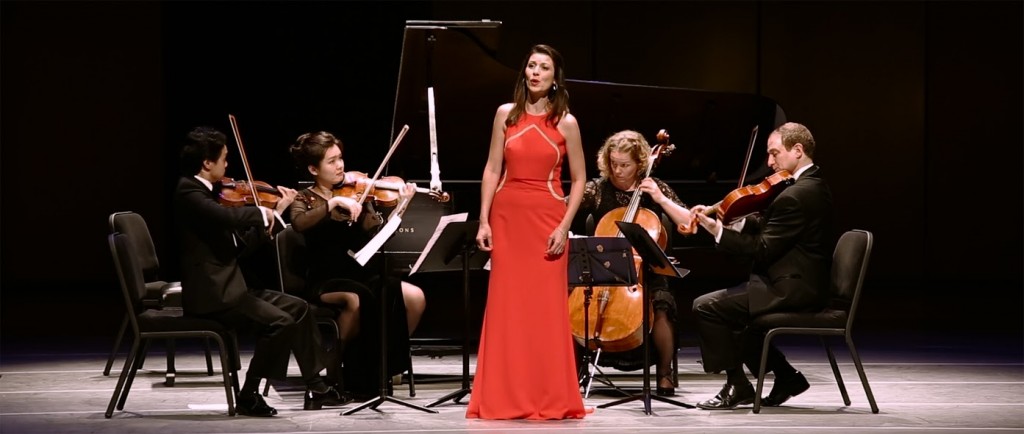
The Miami Chamber Music Society closed out its 2015-2016 season with the Mainly Mozart Festival, which opened with the namesake composer, but featured many others.
The first work on the July 1 program was Wolfgang Amadeus Mozart’s Exsultate, Jubilate (K. 165). Taking the stage for the performance was a string quartet made up of members of the Metropolitan Opera Orchestra (violinists Yang Xu and QianQian Li, violist Dov Scheindlin and cellist Kari Jane Docter), and soprano Chen Reiss. From the start, it seemed like the size of the Knight Concert Hall at the Adrienne Arsht Center was a bit too big for the sound of this chamber ensemble to fill. Throughout much of the evening, the string quartet sounded a little light, although Reiss’s ringing tone carried effortlessly.
The second piece was Antonin Dvořák’s Piano Quintet (in A, Op. 81). This time the string quartet was joined by pianist Marina Radiushina. The quintet opened with a beautiful solo from cellist Docter. Solo lines then sang nicely throughout the strings. Once Radiushina entered, her piano spoke clearly above the more restrained quartet members.
Much like in the Mozart, the strings struggled with projection, although the violins faired a bit better than the low strings. The second movement felt comfortable, but could have used a little more risk-taking on the part of the performers. As it was also a long middle movement, this could have driven it a bit better.
Between the two works, the Mozart seemed the more interesting addition to the first half, largely thanks to Reiss. The Dvořák, for its scope, may have better served as a complete half, instead of being paired with something else.
The second half of the concert was a different idea entirely. Where the first half featured two conventional stand-alone works, the second half was a single fusion of several pieces by a variety of composers, paired with a narrated film, a slideshow of several artworks, and dancing from five members of the Miami City Ballet. Each piece, by composers ranging from Estonian minimalist Arvo Pärt, to English film composer Clint Mansell, to Italian opera legend Giacomo Puccini, somehow tied into the project’s theme of “A Timeless Rose.”
This performance should be applauded for its effort and ambition, even if it was not completely successful. There was a sense with the opening film that this assembled piece was preoccupied with being profound above all else. Each successive piece of music seemed to dwell in a dark, minor, moody place, trying hard to add seriousness to the whole event. Although most of the titles alluded to a rose, it was often difficult to trace the narrative from one piece to the next.
The fusion of each artistic element did not quite seem to stick, either. The music consisted of preexisting, largely standard works, as did the projected artwork. The dancing, too, seemed to stick to conventions. Each art form seemed to bring its own traditions to the table, making it difficult for all of the elements to fully incorporate. Creating a multi-genre work is a great idea when combining different ingredients together, but this was trying to combine completed dishes in a way that never quite worked.
All of this being said, the second half of this concert was considerably more exciting than the first. Even if it did not come off as well as hoped, this production represented a greater risk on the part of the Miami Chamber Music Society, and should be applauded.
Here is a 7-minute film from the festival featuring excerpts from the final concert.
Editor’s note: The publication of this review was delayed by technical factors.